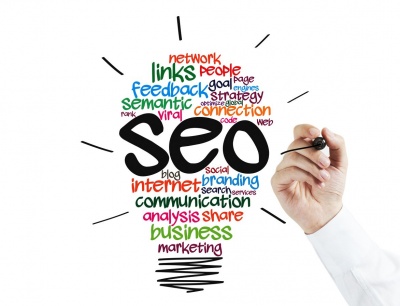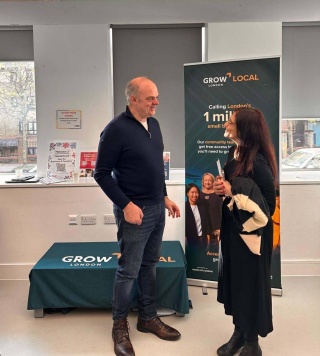WHAT IS SEO? A CONCISE GUIDE TO SEARCH ENGINE OPTIMISATION

With Google processing between 8.5 billion and 13.5 billion searches per day, Search Engine Optimisation (SEO) is a crucial tool for online success. As users look for everything from quick answers to in-depth guides, appearing in those search results — for businesses and individuals alike — can mean the difference between thriving online and remaining invisible.
But what is SEO, and why does it matter? In this guide, I will explain what SEO is, shedding light on its fundamental concepts, practical applications, and profound impact on digital visibility.
What Is SEO?
SEO or Search Engine Optimisation, is the practice of enhancing a website's visibility on search engines like Google, Bing and Yahoo. The primary goal is to improve the website's ranking in search engine results pages (SERPs) for relevant keywords, thereby increasing organic (non-paid) traffic.
What Is Crawling in SEO?
Before a website can appear in search results, search engines first need to find and understand its content. This process starts with crawling.
Search engines use automated programs called bots or spiders that follow links across the web, moving from page to page. When a bot visits your site, it scans the content, links and structure to gather information.
A few key factors affect crawling efficiency:
- Sitemaps: Submitting an XML sitemap helps search engines find all important pages on your site.
- Robots.txt files: These tell search engines which pages they should or shouldn’t crawl.
- Internal linking: Clear navigation and internal links make it easier for crawlers to discover deeper pages.
- Site speed and accessibility: If a site is slow or frequently down, crawlers may visit less often.
Once a page is crawled, it can then be indexed — stored in the search engine’s database, ready to be shown in results. Without proper crawling, even the best content won’t appear in search results.
What Is Indexing in SEO?
Once a page is crawled, search engines need to decide whether it should be added to their index — a massive database that stores information about billions of web pages.
During indexing, search engines analyse a page’s:
- Content: Text, images and media are scanned to understand what the page is about.
- Meta tags: Titles, descriptions and structured data provide context.
- Relevance and quality: Thin or duplicate content may not be indexed at all.
- Accessibility: If a page is blocked by robots.txt, noindexed or difficult to load, it may not be stored.
Only pages that make it into the index are eligible to appear in search results. Optimising for indexing ensures your valuable content isn’t overlooked by search engines.
Core Elements Of SEO
SEO is made up of several interconnected elements that work together to improve visibility and performance in search results. From understanding the right keywords to ensuring your website runs smoothly and earns authority across the web, each aspect plays a vital role in achieving lasting organic growth. Let’s explore the key components that form the foundation of an effective SEO strategy.
What are keywords?
Keywords are the foundation of SEO. These are the terms and phrases users type into search engines when looking for information. Effective SEO involves
What is on-page SEO?
On-page SEO involves optimising individual web pages to make them more search-engine-friendly. This includes optimising meta tags (title, description), using relevant headers, creating quality content and incorporating keywords naturally. For a detailed breakdown of practical techniques, check out our guide on eight on-site optimisation SEO strategies you can’t miss.
What is off-page SEO?
Off-page SEO focuses on factors outside the website itself, such as backlinks. Quality backlinks from reputable websites can significantly boost a site's credibility and authority in the eyes of search engines.
What is technical SEO?
Technical SEO involves optimising your website’s structure and performance to meet search engine requirements, helping it rank higher in organic search results. This includes website speed, mobile-friendliness, secure (HTTPS) connections and proper website structure.
Why user experience matters in SEO
Search engines increasingly prioritise user experience. Websites that are easy to navigate, mobile-friendly and provide valuable content tend to rank higher. Google, for instance, factors in metrics like bounce rate and time on page when determining rankings.
What is local SEO?
For businesses targeting specific geographic areas, improving local SEO is a powerful strategy. Optimising your Google Business Profile, building local citations and encouraging customer reviews can help you appear in the coveted “map pack.” For service providers, restaurants, shops and other local businesses, strong local SEO translates into more calls, visits and enquiries.
Why content is important for SEO
Content remains the heart of SEO. Search engines reward websites that regularly publish high-quality original and relevant content.
This could take the form of:
- Blog posts and how-to guides
- Case studies and whitepapers
- Product descriptions
- Videos, podcasts or infographics
By aligning content with search intent, businesses establish themselves as trusted authorities while steadily attracting organic traffic.
How to measure SEO success
Implementing SEO without tracking performance is like sailing without a compass. Tools such as Google Analytics, Google Search Console and platforms like SEMrush or Ahrefs allow you to monitor:
- Keyword rankings
- Organic traffic growth
- Click-through rates (CTR)
- Conversions and leads generated
Tracking ensures that your SEO strategy remains focused on delivering tangible results. For a structured, step-by-step approach to building long-term SEO growth, check out our Six Month SEO Roadmap.
Why Is SEO Important?
Understanding how SEO works is one thing — but knowing why it matters is what truly highlights its value. In an online world where countless websites compete for attention, SEO gives your business the visibility and credibility it needs to stand out. It’s not just about ranking higher on Google; it’s about reaching the right people, building trust and creating a long-term digital presence that continues to deliver results.
Increased visibility
Think of the internet as a massive library, constantly growing with new information. Without SEO, your website is like a book placed on a random shelf with no catalogue entry. The chances of someone stumbling upon it are slim. SEO acts as your website's librarian and cataloguer. By optimising your content and website structure, you're essentially telling search engines what your site is about and why it's relevant to specific searches.
The higher you rank, the more prominently you appear in those search results – the front shelves of the library, so to speak. This increased visibility directly translates to more eyes on your website, increasing brand awareness and the potential for traffic. In today's competitive digital landscape, standing out is paramount and SEO is a fundamental tool for achieving that.
Credibility and trust
When a website consistently ranks among the top results on search engines like Google, users often subconsciously interpret this as a signal of authority and reliability within its industry. This perception stems from the understanding that search engines prioritise and showcase websites deemed most relevant and valuable. Consequently, appearing at the top not only increases visibility but also lends an inherent credibility to the brand.
Effective SEO strategies, by focusing on factors like high-quality content, user experience and authoritative backlinks, actively contribute to building and strengthening a positive online reputation. This enhanced reputation, in turn, fosters greater user trust, encouraging engagement, conversions and ultimately, brand loyalty.
Building credibility with E-E-A-T
Building credibility with E-E-A-T means demonstrating Experience, Expertise, Authoritativeness and Trustworthiness through your content and online presence. When your site consistently shows these signals — from well-researched, accurate information to transparent business details and expert insights — Google is more likely to recognise it as a credible source, improving visibility and rankings in search results.
Learn more about E-E-A-T and how to meet Google’s guidelines here.
Targeted traffic
By meticulously optimising website content and structure for specific, relevant keywords – the exact phrases and terms users type into search engines when seeking particular information, products or services – SEO acts as a highly effective magnet. Instead of casting a wide net and hoping to catch anyone, keyword optimisation ensures your website appears precisely when individuals are actively expressing their needs and intent. This results in a stream of targeted traffic – visitors who have a pre-existing interest in what you offer. While these users are further along in their decision-making process, actively looking for solutions or information you provide, they are significantly more likely to take the desired action, whether that's making a purchase, submitting a contact form, subscribing to a newsletter or becoming valuable leads for your business.
Cost-effectiveness
While paid advertising campaigns can deliver immediate visibility and a quick influx of traffic, their effectiveness is directly tied to ongoing expenditure. Once the budget is used up, the traffic comes to an end. In contrast, SEO is a cost-effective long-term strategy because the foundational work of optimising your website and content builds an asset that continues to attract organic traffic over time without direct per-click costs.
Although SEO requires an initial and ongoing investment of time, effort and potentially resources in areas like content creation and technical improvements, the resulting organic traffic – visitors who find your site naturally through search results – is essentially 'free' in the long run. This sustained flow of relevant traffic can lead to a significantly higher return on investment over time compared to the continuous costs associated with paid advertising, making SEO a valuable and enduring component of a comprehensive online strategy.
Competitive advantage
Most businesses now understand the importance of SEO. By neglecting it, you risk being overtaken by competitors who consistently rank higher.
A strong SEO strategy ensures your brand remains visible, competitive and top-of-mind in your industry.
Final Thoughts On SEO
Search Engine Optimisation is more than a marketing buzzword – it’s a multifaceted approach that improves your website’s visibility, credibility and long-term growth. By combining keyword research, on-page optimisation, technical foundations, quality content and continuous measurement, SEO unlocks opportunities to connect with your audience in meaningful ways.
In today’s digital-first economy, mastering SEO is no longer optional – it’s essential. Whether you’re a small business targeting local customers or a global brand competing at scale, SEO is the key to sustainable online success.
Contact our expert London SEO agency to unlock the full potential of SEO and achieve measurable results that stand the test of time.

